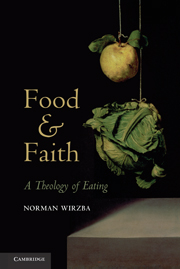Book contents
- Frontmatter
- Contents
- Foreword
- Preface
- 1 Thinking Theologically about Food
- 2 The “Roots” of Eating: Our Life Together in Gardens
- 3 Eating in Exile: Dysfunction in the World of Food
- 4 Life through Death: Sacrificial Eating
- 5 Eucharistic Table Manners: Eating toward Communion
- 6 Saying Grace
- 7 Eating in Heaven? Consummating Communion
- Author Index
- Subject Index
- Scripture Citation Index
6 - Saying Grace
Published online by Cambridge University Press: 05 June 2012
- Frontmatter
- Contents
- Foreword
- Preface
- 1 Thinking Theologically about Food
- 2 The “Roots” of Eating: Our Life Together in Gardens
- 3 Eating in Exile: Dysfunction in the World of Food
- 4 Life through Death: Sacrificial Eating
- 5 Eucharistic Table Manners: Eating toward Communion
- 6 Saying Grace
- 7 Eating in Heaven? Consummating Communion
- Author Index
- Subject Index
- Scripture Citation Index
Summary
Nothing before God belongs to us as our own, if not our ability to say thank you. What may appear as the most tenuous, the most slender of all possibilities is in truth the highest and most extensive: the praise that responds to the divine giving is the essence of human speech. It is in speech that the gift is received, and that we can give something of our own, in other words ourselves.
Thanksgiving is the power that transforms desire and satisfaction, love and possession, into life, that fulfills everything in the world, given to us by God, into knowledge of God and communion with him.
The world will be lifted, as it was always meant to be lifted, by the priestly love of man. What Christ has done is to take our broken priesthood into His and make it strong again.… It will be precisely because we loved Jerusalem enough to bear it in our bones that its textures will ascend when we rise; it will be because our eyes have relished the earth that the color of its countries will compel our hearts forever. The bread and the pastry, the cheeses, the wine, and the songs go into the Supper of the Lamb because we do: It is our love that brings the City home.
To say grace or offer a benediction of thanksgiving over a meal is among the highest and most honest expressions of our humanity.
- Type
- Chapter
- Information
- Food and FaithA Theology of Eating, pp. 179 - 210Publisher: Cambridge University PressPrint publication year: 2011



